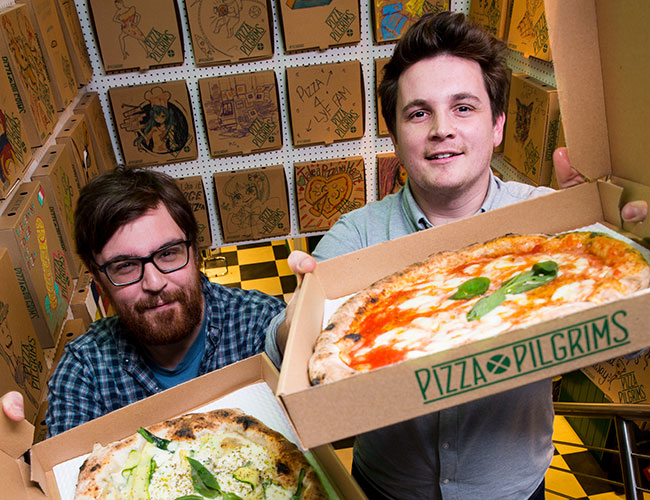All rise: the story of Pizza Pilgrims
Pizza Pilgrims' Thom and James Elliot took an idea they had one night in the pub and made it into one of the original street food success stories. Now, with six sites under their belt and another on the way, they share with Tom Vaughan how they went from pop-up to permanent
Where did the idea for Pizza Pilgrims come from?
Thom It started off as such a little idea that has become completely mega. I worked in advertising and my brother worked in TV. Our parents had always run hospitality businesses – we grew up in a pub that our parents ran. We were having some pints one day and talking about how we might get out of our jobs and into food. The street food thing was just happening and it was a way to do a food business without the money or the expertise. We were on our fourth or fifth pint when we said: "Right, this is what we're going to do, and we're going to do pizza because no one else has done it".
How did you evolve it from a drunken idea to a business plan?
Thom James had done a cookery course in Italy the year before for his 21st and had seen the little Piaggio Ape vans. We thought about putting a pizza oven in one and, rather than spend £1,500 importing the van, we decided to go to Italy and spend £1,500 travelling back with it. It sounds like a massive cliché, but we genuinely went to Naples, had our first Margherita, and we were like: "Wow, you can't get this in England. This is unbelievable. This is what we need to be able to recreate".
The business idea at that stage was to do events - weddings, bar mitzvahs and festivals - like a catering business. Then we realised that we really did need a presence if we were going to get anywhere. When we got back from the trip, we ripped up Business Plan A and said: "We need a market stall". So we called some councils: Islington, Westminster, Camden. They all said they had nothing, but we kept pestering. It got to the point where we'd go down to the markets and call them and say: "I'm standing in the market, at the space you told us was full, and there's no one here".
James Thom's very persistent. He kept badgering them until it was easier for them to do something than not. The first people to give up were Westminster. They said if we promise never to call again, we could have a pitch on Berwick Street Market.
Thom We had start-up costs of £15,000 spread across two credit cards. It was definitely not money we had in our back pockets. The van was £7,000, the oven £4,000. I remember having to make crazy decisions, like could we afford to buy a workstation on wheels - it was £1,000 and we agonised over it. It was almost a choice between that and a roof over our heads, but we went for it and we still have it.
You rode the crest of a wave with street food. Would Pizza Pilgrims pick up as much traction now?
Thom I think it would take longer. We got quite an explosion of attention because we were one of the first people to do pizza out of a van.
James I wonder, if we did it again, whether it would have turned into a restaurant. You look at [street food market] Kerb now and everyone's doing seriously good business. We're opening soon in West India Quay and they've got a street food market there. I was there last week and a lot of our friends are running street food vans and they're doing 200 covers for lunch.
Thom I think our busiest ever lunch was 137 pizzas. But we were slow - really slow.
Was it always your goal to move into bricks and mortar?
Thom No. We started it as an events business - it wasn't 'Let's buy a van so we can start a restaurant'. We started the business in March and soon had bookings for festivals. By May, V Festival had booked us, along with two or three others, and that made us sit up and go, "OK, this is the real thing". Our chairman now, Rupert Cleverly, is James's godfather, and he used to run Geronimo Inns. So we emailed him and said: "We're considering whether there's a bricks and mortar project in this".
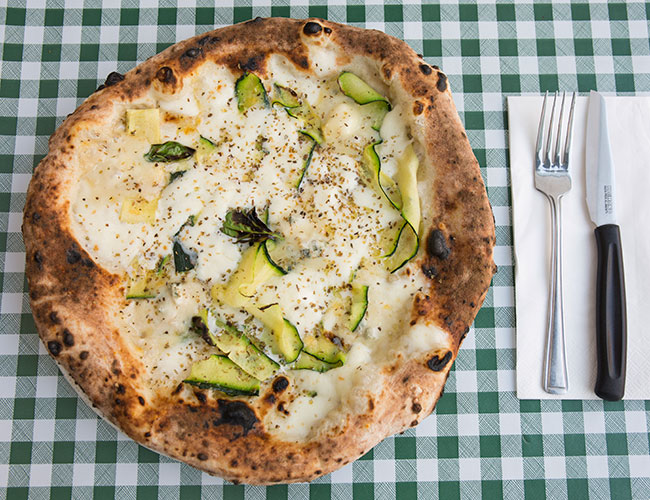
James Bear in mind that we hadn't seen him in about 15 years.
Thom It was definitely a cold email! But he said that this is a very competitive market and I don't see why you are differentiated, I don't see what you are bringing to the game, I don't see that it's an investment. And so we went away and, about six months after that, we had a book deal and the TV show of our trip to Italy [Pizza Italiana with Thom and James on the Food Network] was being broadcast, so we went back to Rupert, told him the kind of numbers we were doing and that we still thought there was something in it. Only then did he agree that there was a bricks and mortar project.
How did you raise the investment for your first permanent site?
Thom It was just amazing, actually. There were 15 investors in total. I reckon we brought three to the table and Rupert brought the other 12, including himself. They were all ludicrously experienced. They included John Barnes, who built Harry Ramsden's; Sean Williams, who was head of M&A at PWC Leisure; and Warren Johnson, who founded W Communications. They all put in a little bit of money and we had all these amazing people to call on - a team of dragons - but with no one going, "I put loads of money into this, where's the return?" We raised £250,000 and could open our restaurant in Dean Street.
What were the challenges of moving into a permanent site?
Thom We spent £150,000 on a premium, so that tells you how little money we spent kitting out Dean Street. It was James and me painting the walls, we didn't have a walk-in fridge and it turns out that when you make an active product like dough and the temperature goes below 2ºC, it fundamentally changes it. So not having a walk-in fridge was probably the worst decision we ever made.
James We'd had a pretty charmed run for a year and a half with street food and then we opened a restaurant. I refer to it as the crazy-ass period, because you'd be up at 6am doing all the email stuff and then you'd start serving at 12 and finish at midnight for six months straight.
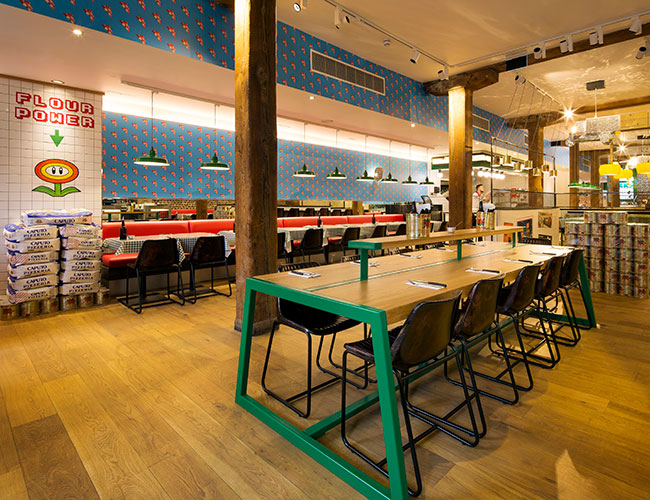
How did you end up expanding?
James It was entirely opportunistic. We really, genuinely, sat there in Dean Street, even after six months, going, "How do you do two restaurants?" And then Shaftesbury, the landlord of Carnaby Street, was redeveloping Kingly Court and emailed us out of the blue. They told us their vision and how they had a restaurant site that they wanted to be a pizzeria and they wanted it to be us. We went down to look at it and we were like, "I don't know, I don't really see it". The investors told us that we had no idea what an opportunity this was and that we had to take it. So Shaftesbury put us in there, they didn't take any rent insurance off us, and they gave us huge amounts of free rent.
What was it like, two people with little to no industry experience running a small group?
Thom One of the benefits we had was our naivety. Although we made a lot of mistakes, we had fresh eyes.
James For me, one of the main things was looking at how we treated the people working in the company. I think there can be a hard-earned mentality when you are running restaurants, where managers are only worth as many hours as they work in the week. Some managers in the company talk about pulling 90-hour weeks in former jobs. I think we're quite proud of how we looked at that culture - not pushing people to their limit until they fall over and then go, yes, that's enough.
I feel, if I'm really honest, a lot of it came from reading up about Huw [Gott] and Will [Beckett] at Hawksmoor, and Danny Meyer [of Union Square Hospitality Group]. I think we also bring a street food mentality, where you wear a lot of hats. We design and build the restaurants ourselves and we don't have flash kitchens. If you have a kitchen designer contracted to design your kitchen, you will have one hell of a kitchen. I designed our first restaurant on Microsoft Paint! I still do it now on Keynote on Apple.
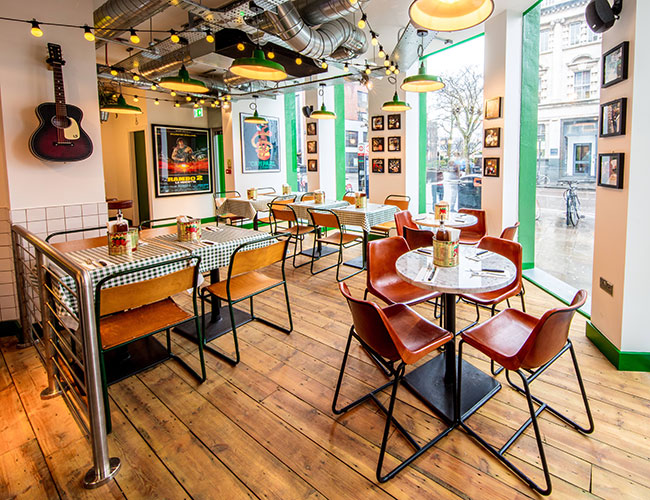
What's next for the company?
James We've just opened in Canary Wharf. A stretch of West India Quay is being regenerated and we're in a beautiful, Grade I-listed old docking building. We are quietly calling it the Pizza Playground, because it's something opposite to that kind of formal dining you used to get in Canary Wharf. It's got 174 covers, we've put a bowling alley on the terrace and we've got a tie-in with Nintendo, bringing a dedicated area with a sofa that we are calling 'Your Perfect Night in, Out'.
Thom We're going to have to work on the name! Then we're going to Oxford. I went to university there and there was the worst nightclub in the world in this shopping centre called the Westgate. I hated it. But they've knocked the Westgate to the ground and rebuilt it and it has this amazing terrace with a Curzon Cinema and 11 restaurants and we were approached for that. So we're doing it, which is again a terrifying proposition, but it's a new challenge.
What does the future hold for you two and Pizza Pilgrims? Is there an exit strategy?
Thom There's a great podcast called 'How I built this', about people who have created great companies. The first one, which is about the founder of Spanx [US billionaire Sara Blakely], is the best one. When she'd just started the company, people would ask what her exit strategy was, and she was like, "What are you talking about? I just started this thing!" She says it dawned on her then that people started companies in order to sell them, and I guess neither of us really have that mindset.
James At the moment, West India Quay is all-encompassing so it's pretty hard to look further forward than six months.
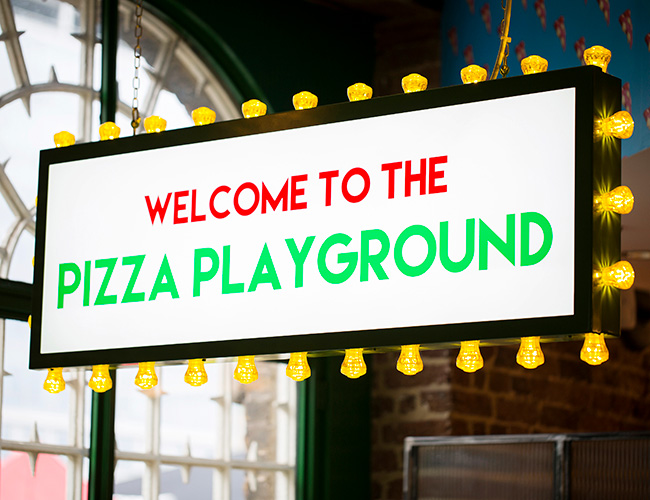
What advice would you give to entrepreneurs who want to follow the same route?
Thom I think what I have been surprised about - and this is a really, really dull answer - is how important the numbers are. All the fun shit comes from knowing the numbers. When we started out, our investors were hammering us with the need for a proper finance team, and we were like: "Surely if you just add it up, we'll have a good idea". But we built this big finance team in our head office. I think in a restaurant group of our size, to have a finance team like ours - we don't outsource any of it, it's all in-house - is unique. But it's invaluable for whenever we need to understand something.
James My answer would be that people often sit around and plan their street food venture for years and don't do it, so it becomes a seemingly impossible task to make the dream happen. Just do it - do a version of it. If you want to start a pizza van, buy a pizza oven and make pizza for your friends and then it's just a step process from there. Otherwise, it's just a cliff face.
From the menu
Carciofi fritti (deep-fried, breaded artichoke hearts) £4
Arancini rosso (tomato risotto balls with peas and smoked mozzarella) £4.50
Margherita (tomato, fior di latte, Parmesan, basil and olive oil) £6.85
Aubergine Parmigiana (Margherita with roast aubergines and baby plum tomatoes, topped with Parmesan and breadcrumbs) £9
Salsiccia & Friarielli (white pizza with fennel sausage, chilli, wild broccoli, Parmesan, basil and olive oil) £10
Calzone Ripieno (folded pizza with Napoli salami, ricotta and mushroom, topped with tomato, fior di latte and Parmesan) £11
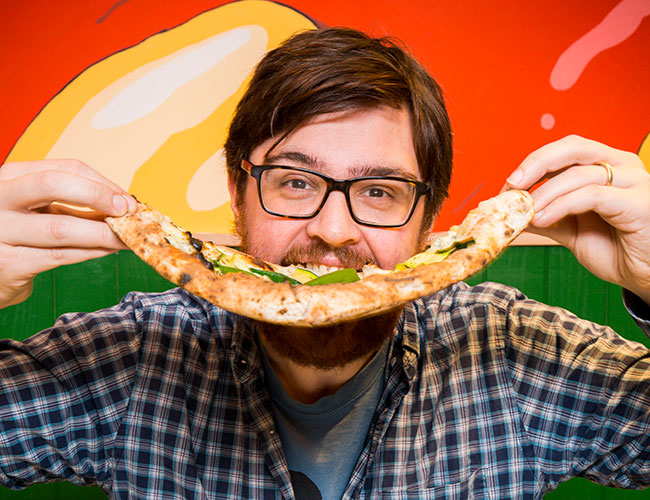
Pop-up pioneers
Other street food entrepreneurs who made the move to bricks and mortar
MeatLiquor
Credited with helping kick-start the street food movement in London, Yianni Papoutsis began serving gourmet burgers from a van in New Cross in 2009. The first van was vandalised and the second stolen, but people were soon making the trek across the city. The group now boasts 12 restaurants across London, Leeds, Brighton and Bristol.
Flat Iron
The brainchild of ex-Wahaca advisor Charlie Carroll, Flat Iron began life as a pop-up above a pub in 2012, serving affordable flat iron cuts of steak for £10. The group now operates four restaurants in London.
Mac and Wild
Founded in 2010 by Andy Waugh, a Scot who harked from a family of game butchers, the Wild Game Co began life on Broadway Market in London selling Scottish game. In 2015 it made the move into bricks and mortar in London's Fitzrovia and now operates two restaurants in the capital.
Pizza Pilgrims' London sites
Dean StreetOpened August 2013
Covers 60
Kingly StreetOpened August 2014
Covers 100
Exmouth Market
Opened November 2015
Covers 40
Covent Garden
Opened May 2016
Covers 60
Swingers
Opened May 2016
Covers Takeaway only
Shoreditch (BYOB)
Opened April 2017
Covers 60
West India Quay
Opened May 2017
Covers 200



